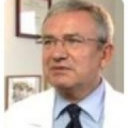[Diagnostic difficulties in primary mesothelioma].
Mots clés
Abstrait
A 54-year-old woman with a history of fatigue and shortness of breath was found to have a pericardial effusion and mild mediastinal lymphadenopathy. Video-assisted pericardioscopy revealed thickened pericardium studded with multiple nodules. Histologically the tumor was diagnosed as papillary adenocarcinoma. The site of the primary tumor could not be identified. As lung cancer is one of the most frequent causes of pericardial metastases the patient was treated with cisplatin and vinblastin. Following 5 courses of chemotherapy--given over a 4 month period--the amount of pericardial effusion and pericardial thickness did not change. The material from pericardial biopsy was reexamined and positive immunostaining for calretinine was found. The final diagnosis was primary pericardial mesothelioma of epithelioid type. Palliative radiotherapy of mediastinum was planned but the patient deteriorated and died due to disease progression with venous thrombosis and superior vena cava syndrome. The case illustrates the difficulties in establishing diagnosis of primary pericardial mesothelioma which is a rare tumor with poor prognosis.



